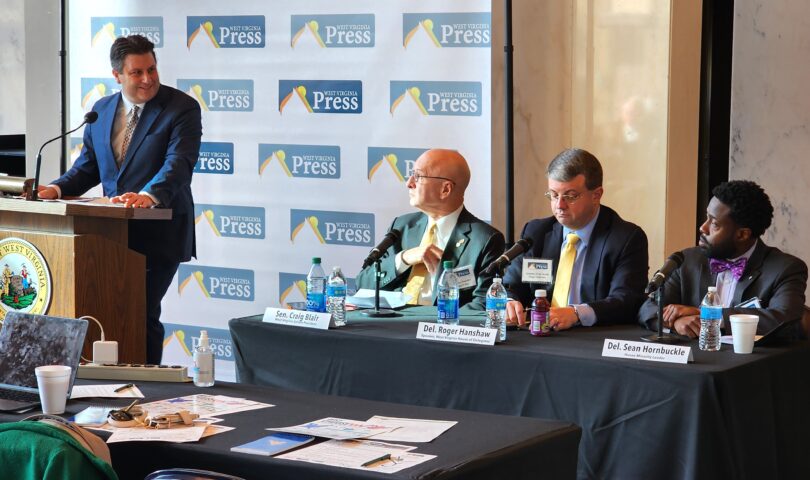CHARLESTON – Legislative leaders offered a preview on Friday of the 2024 legislative session, which begins Wednesday, Jan. 10.
Senate President Craig Blair first offered a quick look back, touting the economic progress the state has made – summarized in a glossy sheet titled, “Why Choose WV?” It covers GDP growth, low workers’ compensation rates, home ownership and the 21.25% personal income tax cut for 2023.
“It’s working ladies and gentlemen,” he said. “It’s working because of things we’ve done in the past. …
What it does it makes us attractive to business.”
Looking forward, he said to watch for a Senate initiative addressing disruptive students, who make it hard for teachers to teach. The idea is to take a disruptive student out to a place with cameras and specialists, and let teachers do their job without disruption.
He favors the governor’s 5% pay raise proposal – the latest in a string of such raises over the past few years, if finances allow.
Blair said he will make the rare move of co-sponsoring a bill – to provide for capital punishment for the illicit manufacture, sale and distribution of fentanyl. He expects no one would be put to death. “What we want to do is send a message out. … Stay the hell out of West Virginia.”
On the last day of the session, March 9, he and House Speaker Roger Hanshaw want to host a trade show at the Capitol, he said. “We want corporate America to know that West Virginia is in the game,” and showcase what’s been done.
People outside the state have better perceptions of West Virginia than we do, he said. “We really need to get the folks to understand how great they are.”
Hanshaw agreed with that comment. “People outside West Virginia think much better of us than we do of ourselves.” It’s easy for us to overlook the quality of opportunity we have here.
Even with the income tax cut, he noted, the first half of the fiscal year ended with a $406 million surplus.
During interims, he said, the joint Fire and EMS Committee worked on legislation to adequately and permanently fund emergency services, and a bill should emerge from that during the session.
Hanshaw said he’s looking forward to the implementation this year of the performance-based higher education funding formula passed in 2022. Before this, an institution’s funding depended to a degree on whether the school has representation on one of the finance committees. As the formula unfolds, they’ll be looking for feedback to see what tweaks are needed.
Other bills on the slate, he said, include one regarding data privacy, with liability shields for businesses that implement proper cybersecurity protocols, and a pay raise for non-uniformed corrections workers.
House Minority Leader Sean Hornbuckle longed for an end of political division. “We have slung so much mud.” Both sides of the aisle need to work together. As far as his side, “We’re going to be a champion for people.”
Hope Scholarship dollars have benefited some, he said, but also have allowed money to leave the state. The Democrats stand by supporting public education.
Other Democrat priorities, he said, include a cost of living raise for state retirees, childcare funding and legalizing adult-use cannabis – a means to address the fentanyl problem while providing tax dollars for spending priorities.
During a Q&A session, the leaders fielded a question about the fentanyl cannabis issue. Blair said legalizing cannabis has come up before and the GOP caucus wasn’t interested, but the conversation will continue. He doesn’t expect anything to pass this year.
Hanshaw said only, “Pushers of fentanyl are murderers.” And Hornbuckle reiterated that adult-use cannabis would be a way to manage the problem of fentanyl-laced illicit cannabis while boosting the economy.
Asked about the government’s role in supporting childcare, Hanshaw said that last year they implemented a funding system to provide childcare tax credits for larger employers and they want to expand that to some smaller employers this year.
Another question focused on further trimming the personal income tax, with benchmarks in place to cut it another 10%.
Hornbuckle said the Democrats want cuts to first benefit the people who need it most. “We’re going to be the watchdog in the room.”
Blair said the current surpluses stem in large part from several years of flatline budgets, which he and several others worked for. And because severance taxes fluctuate so much, they no longer include them in the base budget. Their idea is to let capital investments from business and personal income growth grow state revenues.
Email:dbeard@dominionpost.com




